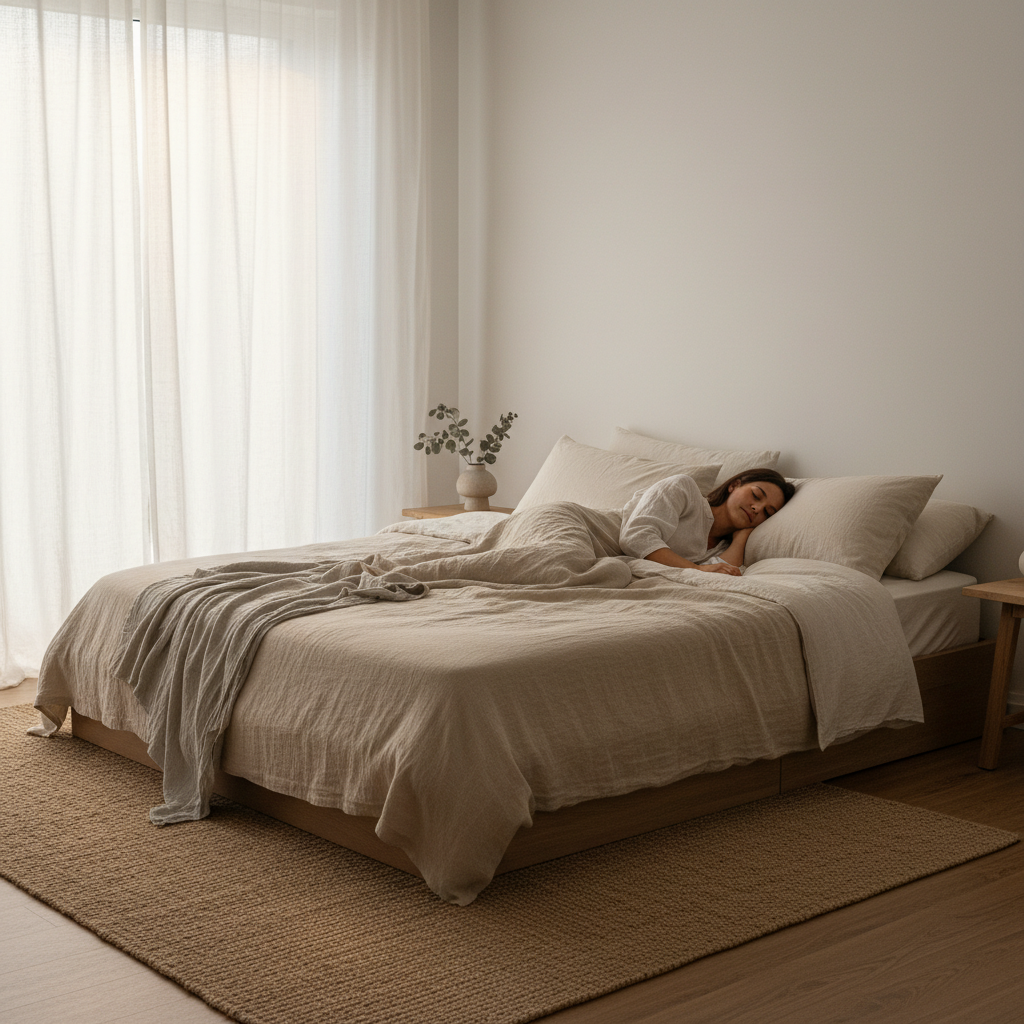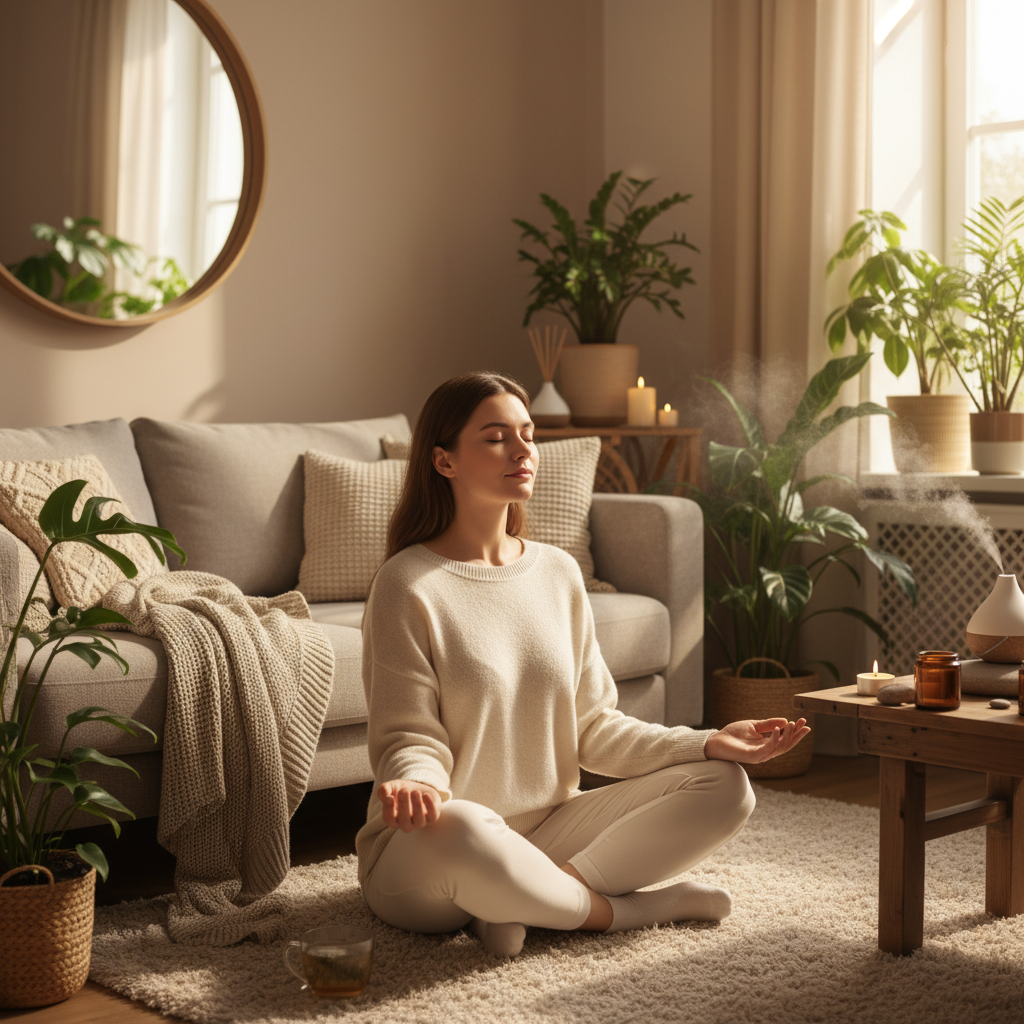
Table of Contents
Introduction
Ever wake up feeling like you got hit by a truck? Yeah, we’ve all been there. That groggy, irritated, “why-is-everything-so-hard” feeling that seems to follow you around all day. You’re definitely not alone in this struggle—millions of people are dragging themselves through each day on poor-quality sleep. And honestly? It’s affecting way more than just your energy levels. We’re talking about your health, your mood, your ability to think clearly. The whole package.
Here’s the thing about sleep—it’s not just downtime for your body. Think of it as your internal reset button. While you’re snoozing away, your brain is busy filing memories, your immune system is getting a tune-up, and your muscles are recovering from the day. Sleep experts tell us adults need somewhere between 7 to 9 hours of quality sleep each night. (Quality being the key word here.) But let’s be real—between our jam-packed schedules, endless notifications, and that “just one more episode” mentality, getting good sleep feels like mission impossible sometimes.
You know what’s interesting? How much our daily habits ripple into our nighttime routine. Take time management, for example. When you’ve got your days organized and stress levels in check, falling asleep becomes so much easier. Learning solid time management skills isn’t just about productivity—it’s about creating space for your mind to actually wind down. And then there’s food. What you eat during the day absolutely impacts how you sleep at night. Planning ahead with something like vegan meal prep recipes can keep your energy steady and prevent those late-night sugar crashes that mess with your sleep cycle.
Now let’s talk about the sleep thief nobody wants to acknowledge: stress. It’s sneaky. You might think you’re handling it well during the day, but come bedtime? Your brain decides it’s the perfect time to replay every worry on repeat. Stress doesn’t just mess with your mind—it physically changes your body. We’re talking tense muscles, racing heart, hormones going haywire. Understanding how stress affects the body can be a real eye-opener. The good news? Simple techniques like breathing exercises for relaxation can actually help flip that stress switch off and signal to your body that it’s time to rest.
What You’ll Learn in This Guide
This guide is your roadmap to better sleep—whether you’re dealing with full-blown insomnia, irregular sleep patterns, or you just want to upgrade your nightly rest. We’re covering all the bases here.
- Understanding Sleep Stages: Explore the different phases of sleep, from light to deep sleep and REM, and learn why each stage is vital for physical and mental restoration.
- Common Sleep Disruptors: Identify barriers like screen exposure, dietary choices, and lifestyle factors that interfere with your sleep and how to overcome them.
- Establishing Effective Sleep Habits: Discover actionable tips for creating a sleep-friendly environment and routine, including bedtime rituals and room optimization.
- When to Seek Professional Help: Understand the warning signs that indicate your sleep issues might require medical attention and how to navigate that process.
As we dig into this together, you’ll discover there’s actual science behind why you feel the way you do—and more importantly, what you can do about it. Here’s something you might not have considered: your breathing. Working on how to improve lung capacity through simple exercises doesn’t just help with fitness—it can actually make a huge difference in how well you relax and sleep. Better breathing equals better relaxation equals better sleep. It’s all connected.
Look, I’m not going to sugarcoat this. Creating lasting sleep changes takes some effort. But here’s what I can promise you: every strategy in this guide is designed to meet you where you are right now. Maybe you’re someone who needs to completely overhaul your bedtime routine, or perhaps you just need a few tweaks to what you’re already doing. Either way, we’ve got you covered.
Because here’s the bottom line—sleep quality touches everything. Your mood, your ability to focus, your physical health, even how you handle relationships. When you finally start sleeping well, it’s like getting your life back. So let’s figure out how to make that happen for you, step by step, in a way that actually fits into your real life. Ready to transform those restless nights into the restorative sleep you deserve?

Let’s be honest—we all know sleep matters. But here’s what might surprise you: it’s not just about feeling less grumpy in the morning (though that’s definitely a perk). Quality sleep literally rewires your brain, supercharges your immune system, and keeps your body running like a well-oiled machine. Yet so many of us toss and turn, staring at the ceiling, wondering why good sleep feels so elusive. Stress, our environment, the choices we make during the day—they all conspire against those precious eight hours. But don’t worry. We’re going to break down exactly how sleep works and, more importantly, what you can do to finally get the rest you deserve.
Understanding Sleep and Its Benefits
Sleep isn’t just your body hitting the “off” switch for a few hours. It’s actually an incredibly sophisticated process with multiple stages, each doing something crucial for your health. Think of it like a nightly maintenance crew for your body and brain. You start in light sleep, then dive deeper where your body gets busy with repairs and immune system boosting. Then comes REM sleep—that’s where the magic happens for your memory and emotions. Missing out on any of these stages? You’ll definitely feel it the next day. This is where good time management skills come in handy—because if you can’t manage your day, you can’t protect your sleep time.
The benefits go way beyond just feeling refreshed. We’re talking about real, measurable improvements to your life. Your body uses sleep time to repair tissues, balance hormones, and recharge your energy stores. Your brain? It’s busy filing away memories, processing emotions, and basically doing a system cleanup. Skip sleep regularly, and you’re basically inviting illness to set up camp in your body. Want to give your sleep an extra boost? Consider incorporating some nutritious vegan meal prep recipes into your routine—the right nutrients can actually help regulate your sleep hormones and support better rest.
Key Aspects of Sleep Benefits
Here’s what good sleep actually does for you (and trust me, the list is impressive):
- Improved Cognitive Function: Ever notice how everything feels harder when you’re tired? Quality sleep sharpens your memory, helps you focus, and makes tackling daily challenges so much easier.
- Immune System Support: While you sleep, your body cranks out infection-fighting cells and antibodies. It’s like having a personal army working the night shift to keep you healthy.
- Mood Regulation and Energy Boost: Good sleep keeps your brain chemistry balanced, which means fewer mood swings and way more energy to actually enjoy your day.
- Physical Health Restoration: Your muscles recover, tissues repair themselves, and your heart gets the downtime it needs. It’s like a full-body tune-up every single night.
Pretty amazing, right? Now let’s talk about how to actually make this happen in your life.
Tips to Establish Healthy Sleep Habits
Building better sleep habits doesn’t require a complete life overhaul—just some smart, consistent changes. Start with your schedule. I know, I know, “consistent bedtime” sounds like something your mom used to nag you about. But here’s the thing: your body loves routine. Go to bed and wake up at the same time every day (yes, even weekends), and you’ll start sleeping better almost immediately. Create a wind-down ritual that signals “sleep time” to your brain—maybe it’s reading a few pages, doing some light stretching, or just sitting quietly for a few minutes. And speaking of routines, mastering time management skills can be a game-changer for protecting your sleep schedule from the chaos of daily life.
Your environment and daily choices matter more than you might think. That phone glowing in your face before bed? It’s messing with your brain’s natural sleep signals. Try putting screens away at least an hour before sleep—your melatonin production will thank you. Same goes for that late-night coffee or heavy dinner. Your body needs time to wind down, not rev up. And here’s something interesting: what you eat during the day affects how you sleep at night. Incorporating healthy plant-based meal preparation can actually support better sleep by providing nutrients that help regulate sleep hormones and reduce inflammation.
Effective Sleep Habits for Better Rest
Want to sleep like a champion? Focus on these game-changing habits:
- Consistent Sleep and Wake Times: Same time every day, every week. Yes, it means saying no to some late-night plans, but your future well-rested self will be grateful.
- Relaxing Pre-sleep Rituals: Find what calms your mind—reading, meditation, gentle stretches. Make it your non-negotiable transition into sleep mode.
- Creating a Comfortable Sleep Environment: Dark, cool, and quiet wins every time. Think of your bedroom as a sleep sanctuary, not a multipurpose room.
- Limiting Stimulating Activities Before Bed: No screens, no heavy meals, no caffeine after dinner. Give your body the chance to naturally gear down for sleep.

Here’s the thing about sleep—it’s not just about feeling rested (though that’s pretty great too). Throughout this guide, we’ve uncovered how sleep is actually your body’s nightly maintenance crew, working overtime to repair, restore, and recharge everything from your immune system to your memory. Those different sleep stages we talked about? They’re like a carefully choreographed dance that keeps your mood stable, your mind sharp, and your body healthy. Now you know what’s really happening when stress, late-night scrolling, or an erratic schedule throws off your sleep game.
The good news? You don’t need a complete life overhaul to sleep better. Small changes add up fast. A consistent bedtime (yes, even on weekends), a calming pre-sleep routine, and turning your bedroom into a sleep sanctuary can work wonders. But here’s what many people miss—your daytime choices matter just as much. What you eat for dinner, how you handle that afternoon stress, even when you squeeze in your workout all play a role in how well you’ll sleep tonight.
Ready to put this knowledge to work? Start with the basics that support better sleep from the inside out. Consider trying some vegan meal prep recipes that’ll fuel your body without weighing you down before bed. If your schedule feels chaotic, working on your time management skills can help you carve out consistent wind-down time. And since stress is sleep’s biggest enemy, understanding how stress affects the body gives you the tools to tackle it head-on.
Look, perfect sleep isn’t about getting everything right every single night. It’s about building habits that work for your real life—not some idealized version of it. You’ve got the knowledge now. You know what good sleep can do for your energy, your mood, and your overall health. So start where you are, pick one or two changes that feel doable, and give yourself time to adjust. Your future well-rested self will thank you for it.
Frequently Asked Questions
-
How many hours of sleep do I need?
- Most adults need 7-9 hours of sleep each night for optimal health.
-
What can I do if I have trouble falling asleep?
- Try relaxation techniques, avoid screens before bed, and maintain a regular sleep schedule.
-
Are naps beneficial or detrimental?
- Short naps can be helpful, but long or late naps may disrupt nighttime sleep.
-
Can diet affect sleep quality?
- Yes, consuming caffeine or heavy meals close to bedtime can negatively impact sleep.
-
When should I see a doctor for sleep issues?
- If you experience persistent sleep difficulties despite good habits, consult a healthcare professional.
